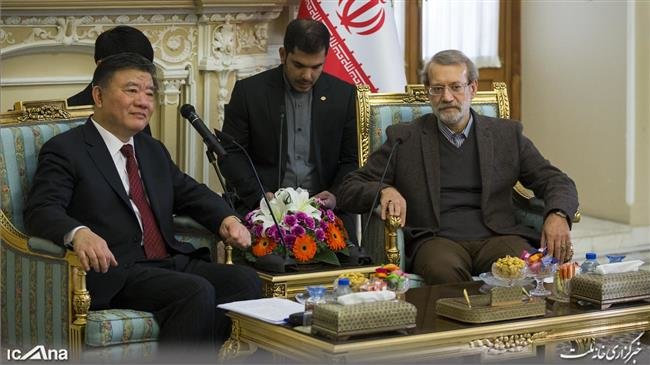
RNA - Speaking in Tehran on Thursday, Larijani said this could bring about a replay elsewhere in Asia of the crisis, which was suffered by Iraq and Syria during the Takfiri terror group's three-year reign in the Arab countries, Tasnim News Agency reported.
Cooperation among Iran, China, Pakistan, Turkey, Russia, and Afghanistan would be of "great significance," he told Chen Zu, the visiting vice-chairman of the Standing Committee of the Chinese National People's Congress.
The remarks echoed similar ones in January by Leader of the Islamic Revolution Ayatollah Seyyed Ali Khamenei.
The Chinese official is in Tehran for an upcoming two-day conference on terrorism to be attended by top parliamentarians from Iran, China, Pakistan, Turkey, Russia, and Afghanistan. The event is the second of its type, the previous one being hosted by Pakistan last year.
He said Tehran and Beijing had enjoyed "good counterterrorism cooperation" in recent years.
Daesh attacked Iraq and Syria in 2014, overrunning huge swathes of territory with the avowed intention of using the countries to expand its turf.
The US enlisted scores of its allies in a self-styled battle to push against the group, but the coalition was remarkably slow in progress despite its sheer size.
According to Press TV, Baghdad and Damascus enlisted the assistance of their allies, including the Islamic Republic, as the outfit was threatening to realize its ambitions. They finally imposed defeat on the terrorists late last year.
Daesh established a comparably limited presence in Afghanistan, where it has mostly run rampant in the eastern province of Nangarhar.
On February 5, three months after the group's defeat in Iraq and Syria, the Associated Press reported that the US military was pulling its forces from a base in Iraq and shifting them to Afghanistan.
The report flew in the face of President Donald Trump's election campaign promises to end Washington's Afghanistan intervention.
847/940